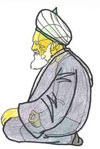about Persian Poet Sa’adi 1184 – 1283
Sa’di (in Persian: ?????, full name in English: Muslih-ud-Din Mushrif-ibn-Abdullah) (1184 – 1283/1291?) is one of the major Persian poets of the medieval period. He is recognized not only for the quality of his writing, but also for the depth of his social thought.
Biography of Saadi
A native of Shiraz, Persia, Saadi left his native town at a young age for Baghdad to study Arabic literature and Islamic sciences at Nizamiah University (1195-1226).
He is known as a Sufi thinker, and was a student of the respected Sufi Sheikh Shahabuddin Suhrawardi. Saadi liked to travel, and lived much of his life as a wandering dervish. After Iraq he traveled the region for nearly thirty years. He went to Shamat (Syria), Palestine, Hijaz (Arabia), Yemen,Egypt and Rum (Turkey), which was in Byzantine control at the time. At one time he is said to have been captured by the Crusaders.
Saadi died in his hometown of Shiraz. There is some discrepancy about the date of his death, but he may have died a centenarian. His tomb was greatly elaborated in 1952 and has since became a tourist attraction.
His works
Saadi’s writings are held to be among the greatest Sufi classics. He wrote “The Orchard” (Bostan) in 1257,”The Rose Garden” (Gulistan) in 1258. There is also a Divan, or collection of his poetry. He wrote short stories and poems about his adventurous life in both his major works.
Saadi has been translated by a number of major Western poets, most of whom were not deterred by the “transparently homoerotic” [1] tone of much of his work. According to Wayne Dynes, “English translators even in the tamer episodes of the Gulistan turn boys into girls and change anecdotes about pederasty into tales of heterosexual Iove.” (Asian Homosexuality p.66)
Chief among these works is Goethe’s West-Oestlicher Divan. Andre du Ryer was the first European to present Saadi to the West, by means of a partial French translation of Golistan in 1634. Adam Olearius followed soon with a complete translation of the Bustan and the Golistan into German in 1654. Ralph Waldo Emerson was also an avid fan of Sa’di’s writings, contributing to some translated editions himself.
One of his more famous quotes is, “Whatever is produced in haste goes easily to waste.” Another famous poem focuses on the kinship of all humans. The same poem is used to grace the entrance to the Hall of Nations of the UN building in New York with this call for breaking all barriers: [2]
“Of one Essence is the human race,
thus has Creation put the Base;
One Limb impacted is sufficient,
For all Others to feel the Mace.”
References
* E.G. Browne. Literary History of Persia. (Four volumes, 2,256 pages, and twenty-five years in the writing). 1998. ISBN 0-700-70406-X
* Jan Rypka, History of Iranian Literature. Reidel Publishing Company. ASIN B-000-6BXVT-K
All text is available under the terms of the GNU Free Documentation License

